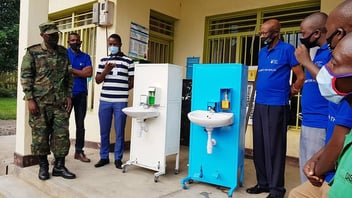The lack of skilled plumbers is a pressing issue globally. In the U.S. alone, an estimated 550,000 plumbers will be needed by 2027. One profound impact: Life-changing projects in the water, sanitation, and hygiene (WASH) sector can’t move forward because the skilled labor isn’t available to do the work.
The International Water, Sanitation, and Hygiene Foundation (IWSH)--the philanthropic arm of IAPMO--wants to amplify its efforts to close the skilled labor gap and address the urgent need for clean water and safe sanitation.
Success Equation: Multiply The Impact of Skilled Labor Through Community Empowerment
Leveraging the resources and connections of IAPMO, the IWSH team created a platform for skilled plumbers to volunteer their time in communities with the greatest plumbing needs. The team then equipped residents and high school students with a new tool called The IWSH Household Plumbing Survey.
Developed to address water quality and efficiency issues in underserved communities, the IWSH Household Plumbing Survey is an easy-to-use tool that community residents and students can use to identify where skilled plumbers need to make repairs and update fittings, fixtures, and appliances.
.jpg?width=705&height=591&name=Untitled%20design%20(24).jpg)
“The skilled labor component has been a vexing challenge to WASH sector progress because these plumbing projects are complex. These are not simple DIY repairs,” said Robyn Fischer, IWSH Senior Director, North America.
“Plumbing qualifications are essential because if you don't know what you're doing, you can put literally an entire city at risk,” noted Jed Scheuermann, a master plumber and IWSH North American Program Director.
Skilled plumbers appreciate the IWSH Household Plumbing Survey because it frees them up to concentrate on the actual repairs and upgrades. “The IWSH Household Plumbing Survey is easy to deploy with residents and students and requires minimal training,” Fischer said. “It speeds up the ability for plumbers to make the needed repairs while also introducing potential new career pathways for students and adults.”
A Case Study: Using the IWSH Household Plumbing Survey to Address the Alabama Wastewater Crises

IWSH has been testing and refining the IWSH Household Plumbing Survey among high school students in rural Lowndes County, Alabama where an estimated 80% of households live without adequate plumbing systems.
In collaboration with the Blackbelt Unincorporated Wastewater Program (BBUWP) IWSH staff trained two groups of local high school students--first in May 2023 and then in April 2024--applying the survey to 24 homes in total. They gained valuable exposure to a career in plumbing, accelerating the necessary plumbing upgrades while contributing to a brighter, healthier future for their community. BBUWP paid the students $20 an hour from grants.

Randy Lorge training local high school students to use the IWSH Household Plumbing Survey
“They're looking at plumbing differently, saying ‘you know what?’ Plumbing can help our community,” said Randy Lorge, IWSH North American Program Director, who led the IWSH Household Plumbing Survey training.
“You can’t have a house without plumbing,” said Lowndes County student Haigler Johnson. “Plumbing is needed and it’s a career many people don’t talk about.”

Global plumbing leader, LIXIL Americas, is the first private sector organization to directly invest talent and resources in Lowndes County to address the water and sanitation crisis. LIXIL Americas engaged IWSH to address the skilled labor component in this rural community, while the company provided the water-efficient plumbing fittings and fixtures for urgent plumbing retrofits.
“We have struggled in Lowndes County to identify certified plumbers who can undertake the upgrade and retrofit of interior plumbing infrastructure inside people's homes,” said Andrea Stowell, strategy and go-to-market leader at LIXIL Public Partners. “IWSH is playing a crucial role in filling the gap for skilled plumbers. Together, we’ve established and demonstrated a working model for addressing water and sanitation issues in rural communities.”
Leveraging the IWSH Household Plumbing Survey, LIXIL Americas will now replicate this model with 80 more homes in Lowndes County.

Plumbing is More Than Unclogging Toilets
The hands-on experience with the survey and working side-by-side with licensed plumbers is changing the narrative around plumbing. Plumbing is not just about unclogging toilets; it's about providing life-changing infrastructure that supports health and functionality in entire communities.
“I thought plumbing was just looking under the sink and seeing what’s wrong, but plumbers have a job that’s very important,” said Lowndes County student Ayala Johnson.
.jpg?width=940&height=788&name=Untitled%20design%20(25).jpg)
IWSH's work highlights the critical role of plumbing in healthcare and sustainability, reinforcing that equity is not possible without clean water and safe sanitation. In Lowndes County, residents and students learned about plumbing as a vocation and the power they hold to address water quality and quality of life in their own communities.
A train-the-trainer program for the IWSH Household Plumbing Survey is in development for use across North America.
Interested in how the IWSH Household Plumbing Survey can help with your WASH sector initiatives? Let’s talk!
.png?width=300&height=57&name=IWSH_Solid_Blue-Black_RGB%20(1).png)


